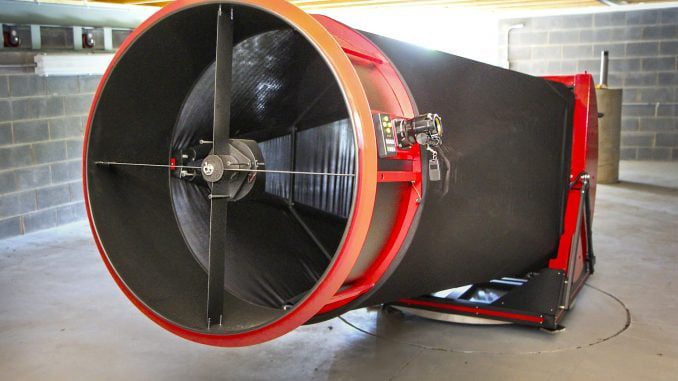
BURNSVILLE Many who look up into the night sky are searching for the beauty of shining stars, constellations such as the Big Dipper or glimpses of the rings around Saturn. The night sky illuminates the Earth below and telescopes provide a scientific tool for viewing the atmosphere beyond Earth.North Carolinians can view celestial objects and phenomena through a telescopic lens with the opening of the Bare Dark Sky Observatory at the Mayland Earth to Sky Park, the first International Dark-Sky Association (IDA) certified Star Park in the southeastern United States.Overseen by Mayland Community College in Yancy County, the Bare Dark Sky Observatory is named for Warren and Larissa Bare and will officially open June 1 at 4 p.m. The new observatory allows community members an opportunity to experience the wonders of the universe, while providing astronomy students with hands-on learning opportunities in addition to hosting classes, field trips, astronomer club events and viewings for the public.”This is important to Mayland Community College so we can invite others who live under light polluted skies to come and experience the difference in actually seeing the night sky,” said Jon Wilmesherr, director of Academic Support Services and Learning Resources Center. “This is the only IDA Star Park in the world that is run by an educational institution. Dark skies are a threatened natural resource. Most people living in the United States today have never even seen the Milky Way. If we do not reach this generation, it could be that soon people will not know to look for the stars.”The IDA is a nonprofit organization that advocates for the protection of the night sky, educates the public on astronomy and promotes environmentally responsible outdoor lighting, and empowers the public with tools and resources to help bring back the night. The organization reports that 13 percent of residential electricity use in the United States is from outdoor lighting. The organization works to guard against skyglow, the artificial brightness of the night sky that’s caused by light pollution. Annually, $3 billion worth of energy is lost to skyglow.”The IDA has a strict application process that requires objective and subjective evaluations of the night sky as well as numerous lightening restrictions,” said Wilmesherr. “We were the 15th Star Park in the world, and satisfied the lighting requirements by changing all of our outdoor lighting at the park to LED lights that are fully shielded and controlled by motion detectors. Many areas self-proclaim to be in dark skies, but the IDA certification means that the park has been verified to indeed be a dark sky area.”The Bare Dark Sky Observatory sits at an elevation of 2,736 feet and offers a 360-degree view. In addition, it houses the “Sam Scope” an f/3.6 StarStructure Newtonian telescope, with a 34-inch (0.86 meter) mirror, named in memory of Samuel Phillips. The telescope is the largest telescope in the Southeast as part of the IDA dedicated for public use for educational and public outreach activities.”We hope this become a destination for visitors to our area. We are offering visitors the opportunity to see parts of the universe that they can’t see any other way,” said Mayland Community College President Dr. John C. Boyd. “We invite North Carolinians to come see the Bare Dark Sky Observatory, our community, the Blue Ridge Parkway and the mountains. It’s a beautiful place to come live or visit, and this is a way we can share that with others.”The project totaled approximately $360,000 with funding for the telescope was provided by the Samuel L. Phillips Family Foundation. Mayland Community College also has a planetary telescope used for viewing the different planets.”MCC offers both curriculum classes in astronomy as well as continuing education courses in the proper use of telescopes,” added Wilmesherr. “Soon we will be offering astrophotography courses as well. Having world-class telescopes under genuine dark skies is wonderful combination for offering high-quality educational experiences.”The public is invited to tour the Bare Dark Sky Observatory and see the telescopes during the opening event on Thursday. Educational videos, outdoor games and tours of the Earth to Sky Park will be available. Of course, visitors are welcome throughout the year to come by and explore.



